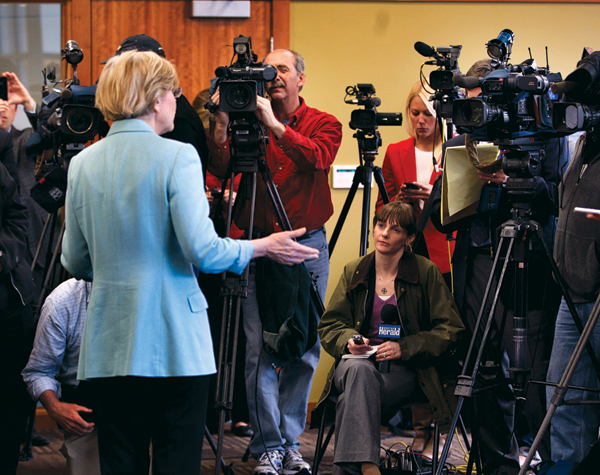Elizabeth Warren: Stumped

Warren at a news conference addressing the controversy over her Native American heritage. (Photo by Steven Senne/AP Images)
To this day, you can hear a bit of a twang in Warren’s voice, a lingering hint of her Oklahoma City upbringing. She and her three older brothers didn’t exactly grow up poor, but there was always an understanding that money was tight in their home. Her father, Donald Herring, was a carpet salesman and maintenance worker who was swindled out of his life savings by his business partner shortly before Warren was born in 1949. On the trail, Warren tells stories of working before she entered adolescence: nursing a neighbor’s colicky baby when she was nine and waiting tables at age 13. Then, shortly after she entered her teens, her father suffered a heart attack. “Daddy came home, gray and shaking, and he sat around the house for weeks,” she wrote in The Two-Income Trap. Her father later took a job that paid only half his old salary. Her mother, Pauline, went to work part-time filling catalog orders for Sears.
Warren enrolled in the city’s most competitive public school (she graduated at age 16), where she developed a passion for debate that led to a full scholarship at George Washington University in 1966. But Warren left the DC school at 19 after reuniting with her high school boyfriend Jim Warren, whom she married not long after. She finished college at the University of Houston in 1970, began teaching special-needs students, and had her first child, Amelia, the next year.
The family later moved to New Jersey, and Warren enrolled at Rutgers School of Law, from which she graduated in 1976. By then she was pregnant with her son, Alexander, which led to incredulous stares during her interviews at white-shoe Wall Street firms. So she set out on her own, writing up wills and doing real estate closings out of her living room.
In time, the Rutgers law school would offer Warren a part-time teaching position. When the family began considering a move back to Texas, she wrote to the University of Houston, asking for a job. “I did my first academic job interview standing in my kitchen at the end of a 20-foot telephone cord,” she recalls, “jiggling a baby in one arm and dodging a five-year-old underfoot while frying pork chops.”
She got the job, but quickly became overwhelmed with juggling her career and her children. “It was hell,” she says. “I loved the teaching, but I had two little babies and I had no support for them. Jim’s position was very straightforward. He said, ‘I like our lives. You don’t have to work. I make a decent living, so if you want to work, this is all on you. I still expect dinner on the table, the kids bathed and ready to go.’” She continues, “In a funny sort of sense, I never held it against him. That had been what he expected when he married me. So I tried, God I tried to keep it all together. And Jim’s view was: ‘Well, then quit. Quit and stay home.’”
Warren instead filed for divorce in 1979. One year later she married fellow law professor Bruce Mann. Warren’s career began to take off, and she was recruited for teaching positions at the universities of Texas, Michigan, and Pennsylvania before arriving in 1992 at Harvard, where she and Mann are now both on the law school faculty.
Warren’s interest in financial law and regulation began when she was at the University of Houston in 1979 and found herself intrigued by a new code Congress had passed that made it easier to file for bankruptcy. “The changes had been pretty profound, and people were anxious,” her friend and colleague Jay Westbrook recalls. “We wondered, ‘How is this really affecting people?’” So together with Westbrook and Teresa Sullivan, a prominent sociologist (who is now president of the University of Virginia), she set out to better understand who was taking advantage of the new law. Traveling across the country with their own photocopier (Warren insisted they bring it to save money on copies), they pored over thousands of filings and conducted hundreds of interviews with individuals who had filed for bankruptcy. Their work would eventually become the largest empirical study of consumer bankruptcy ever done in this country.
Warren has said that when she started her bankruptcy project, she expected to find that those who’d filed were “all a bunch of cheaters.” But what she discovered startled her. “I uncovered how families who worked hard and played by the rules got turned completely upside down by a medical problem, a job loss, or a family breakup,” she recalls. That realization has shaped the bulk of her life’s work.